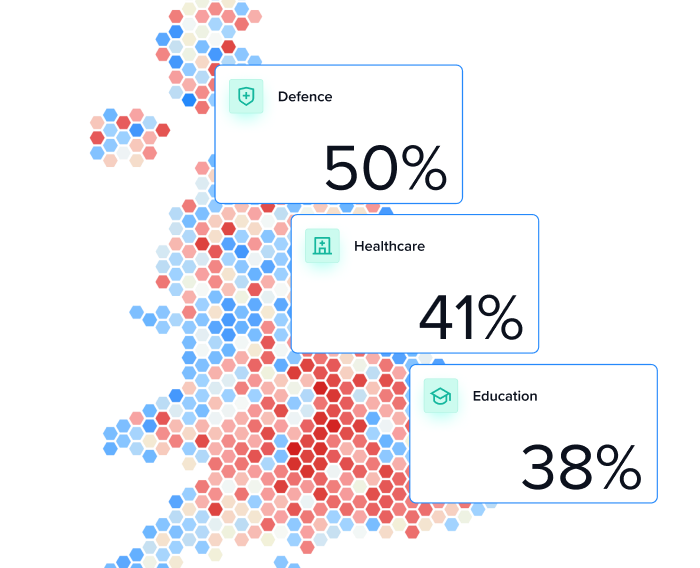Blog/Analysis
Preparing for Conference Season: Pathways to 2029
As the 2025 party conference season kicks off, Focaldata has released original research with expert insights and guidance to help comms and public affairs professionals navigate a chaotic, fragmented political landscape and prepare actionable strategies for the months ahead.
British politics is in a period of profound instability and dissatisfaction. Barely a year after the last general election, economic optimism and government approval ratings are both through the floor.
For the first time, a Nigel Farage-led party has taken a consistent lead in the polls, but may have plateaued at around 30% support. We have four parties polling between 10% and 30%, and a potential Green-Corbyn alliance which could make five.
This level of fragmentation is unprecedented in the modern era. Even small shifts in voter sentiment could radically transform the political landscape between now and the next election in four years' time. It's worth remembering that just over four years ago, the Conservatives were enjoying a double-digit poll lead under Boris Johnson, Keir Starmer was allegedly on the verge of resigning as Labour leader, and Reform UK was languishing at 2%. A lot can change!
For brands and agencies, the message is simple: assume nothing. The next four years could deliver outcomes that might seem unimaginable today. Those who prepare for all possible scenarios and cut through the noise will be better positioned to advise their clients and shape effective communications strategies.
Where we stand today
Labour's current polling numbers are worse than any governing party in the post-war era. Using the invaluable PollBasePro, we find that support has fallen below even the Major government in 1993, which polled at 27% a year after winning the 1992 election and was swept aside by a red wave four years later. Keir Starmer, elected on a platform of change, risks following Olaf Scholz's path in Germany: a rapid rise to power, followed by an equally-rapid collapse under economic pressures and voter disillusionment.

The UK now has its highest 'effective number of parties' since World War II, approaching five viable players. The brief post-Brexit reversion to two-party politics seems over; we are firmly in an era of fragmentation. This created extraordinary challenges for seat projections in a first-past-the-post system, where voters increasingly behave as if they live under proportional representation systems found on the continent.

At the top of the polls, Reform UK is still enjoying its honeymoon period, buoyed by rising public salience of immigration — now at its highest since the 2016 EU referendum. The Conservatives, meanwhile, are down on the last election and polling around 18%.

The threshold for winning a majority is also shifting. Where 40% of the vote once secured a mandate, parties may now govern on as little as 30%. This new reality has profound implications for policy outcomes. Future governments could be formed on narrower mandates and govern on increasingly minoritarian views, raising the risk of more polarised policymaking and fewer incentives for consensus-based approaches.
31% is the key figure to look out for in the polls. Based on current party positions, this is what Reform and Labour would both need to win a majority of seats in an election (though of course that figure could shift if the electorate fragments even further).

What to look out for in the coming months
Issue salience

Immigration is currently at its highest level of political salience since the EU referendum, with nearly 60% of the public citing it as a top issue. However, it's unclear whether this focus can maintain its intensity for another four years in our fast-paced news cycle. That sustainability question has potential implications for party support, as migration salience strongly correlates with polling numbers for the populist right.

Every time a Nigel Farage party has risen over the last 15 years, it has been on the back of rising salience of immigration. It's also important to remember, however, that Reform is not UKIP. Even after accounting for immigration salience, the party has a much higher ceiling and a wider base of support.
Reform is uniquely depending on issue prominence in British politics, making its current lead somewhat precarious. Should migration become less salient, the political landscape could shift dramatically. Labour's strategic imperative is clear: to take the sting out of the immigration debate and reduce public concern. That will be much easier said than done.
By party
Labour
- The autumn budget, expected to take place in late November, could present further challenges for Labour. Rachel Reeves faces difficult decisions and may need to reconsider the party's manifesto commitments on taxation if spending reductions continue to be opposed by MPs.
- Next year's local elections will also be an important test for Keir Starmer's leadership. Should a leadership contest emerge in the aftermath, it appears likely to end up as a head-to-head between Wes Streeting, who has support from the party's right, and a candidate supported by the left. The identity of a left-aligned candidate has become less certain following Angela Rayner's departure from government, with rumours swirling in recent weeks that Andy Burnham is seeking a return to Westminster.
Reform UK
- Reform has done very well in recent local elections, but the party’s record is more mixed when it comes to defending their seats in council by-elections. The party is largely untested in any form of government, and as the party continues to win more council seats going forward, their record in local government may shape voters' decisions by the time of the next general election.
The Conservatives, Liberal Democrats and Greens will be covered in our upcoming breakfast and dinner events for comms and public affairs professionals. Attendees will also hear:
- Our full assessment of today's political environment
- More detail on the pathways to 2029
- What each potential government could mean in policy terms
- How electoral reform could transform political dynamics


